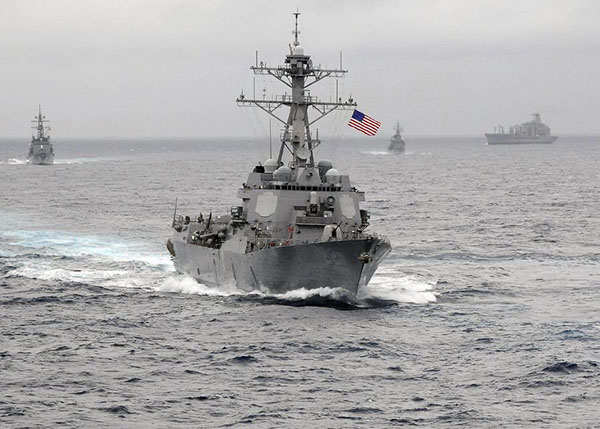 |
|
The US Navy guided-missile destroyer USS Lassen sails in the Pacific Ocean in a November 2009 photo provided by the US Navy. [Photo/Agencies] |
The United States is sending confusing signals over the South China Sea issue and has heightened tensions in the region by sending its warships and planes close to China's islands.
Washington avoided holding military drills or taking other actions that could have further inflamed tensions with Beijing when US guided-missile destroyer USS Lassen entered the waters close to China's islands in the South China Sea, said a Reuters report on Friday, citing anonymous US officials. This exposure is in sharp contrast to the hawkish remarks and actions of high-ranking US officials, including Defense Secretary Ash Carter.
While on an eight-day tour of Asia, Carter boarded a US aircraft carrier in the South China Sea on Thursday and alleged that China has "perpetrated" most of the "activities" in the South China Sea in the past year and expressed concerns over "Chinese behavior".
Both the entry of USS Lassen into the waters near China's islands and Carter boarding a US aircraft carrier were widely seen as Washington's challenge to Beijing's rightful maritime claims in the South China Sea. Besides, the US has held many joint military drills with its allies near the disputed waters in the South China Sea and strengthened its military alliances in the region to implement its "rebalancing to Asia" strategy.
Carter should understand that US actions in the South China Sea are to primarily blame for complicating the territorial disputes and straining relations between the world's two largest economies, which have raised the international community's concerns.
Yet it seems the Pentagon chief has a penchant only for pointing the finger at others while refusing to acknowledge the egg on the face of Uncle Sam. Speaking at the Ronald Reagan Presidential Library on Saturday, Carter said Russia and China pose distinct challenges for the world order because of Moscow's assertiveness and Beijing's expanding military influence.
The pillars of the world order that he said should be defended and strengthened are peaceful resolution of disputes, freedom from coercion, respect for state sovereignty and freedom of navigation. The irony is that, no matter which standards we follow, the US' actions in recent years have posed the greatest threat to these pillars of the world order. In the Middle East, for instance, the US has always preferred interference and intervention to peaceful resolution of disputes. More often than not, it has used coercion to impose its will and values on others. In fact, its recent actions in the South China is alone enough to prove it has no respect for other country's sovereignty, and freedom of navigation is just an excuse it uses to justify its irresponsible remarks and actions.
China has repeatedly said it has no intention of challenging the world order, because it too has benefited from it. Also, China has been a staunch advocate of upholding the post-war world order. The onus, therefore, is on the US to take measures to sincerely defend the world order instead of exploiting it to fulfill its narrow-minded goals.
There has been no fundamental change in China's stance on the South China Sea either. The only change has been in its efforts to maintain good neighborly relations with countries in the region, and to defend its sovereignty and maritime interests.
As for the South China Sea issue, the situation there has, on the whole, remained peaceful and stable since the end of the Cold War, with China playing an important role in keeping it that way. As a country whose national strength far exceeds that of most of the countries in the region, China has exercised exemplary restraint, which is the most important contributing factor to peace and stability in the South China Sea and the region as a whole.
The author is a senior writer with China Daily. wanghui@chinadaily.com.cn